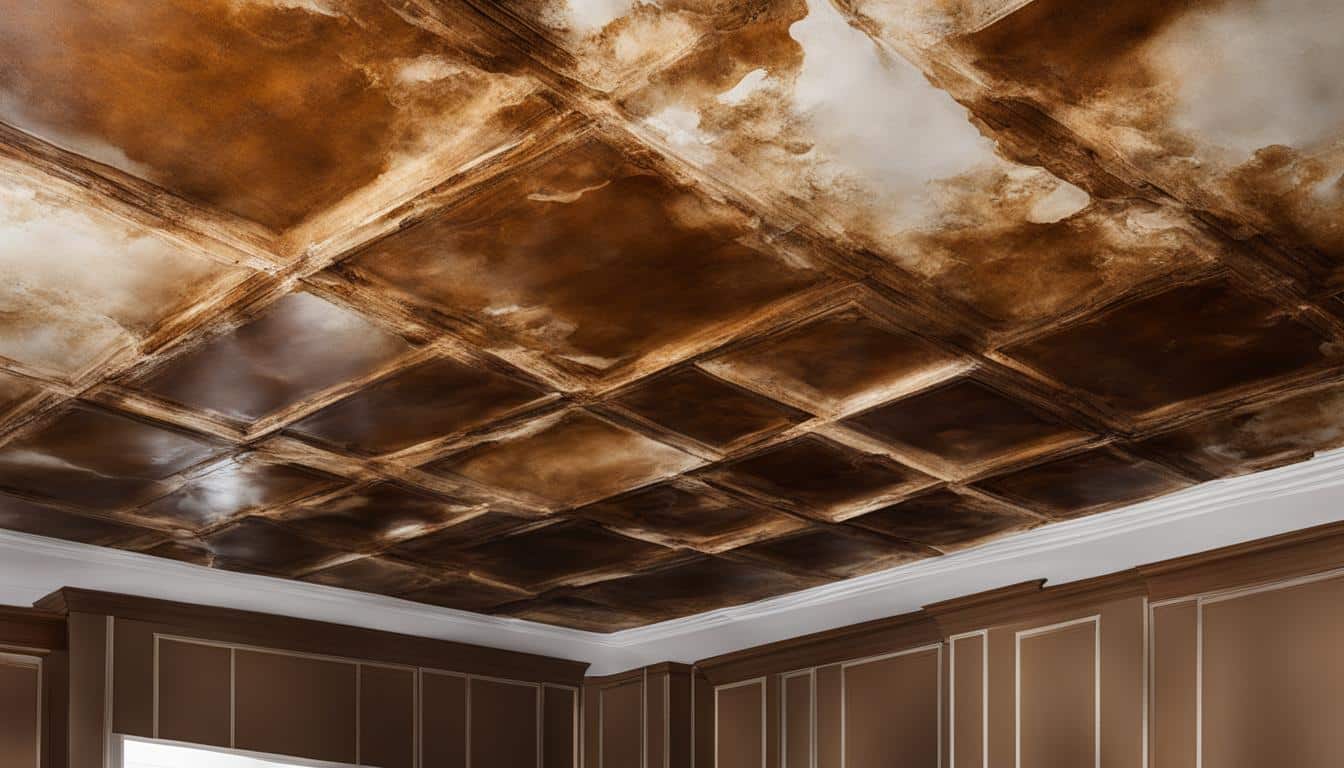Water damage can wreak havoc on your property, whether it’s due to a burst pipe, a leaky roof, or a flooded basement. While some damage can be quickly resolved, it is vital to assess the extent of the damage to determine whether it is permanent or not. Knowing the signs of permanent water damage can help you take appropriate action to protect your home and prevent further harm.
In this section, we will discuss how to assess the permanency of water damage in your property. We will cover the common signs of water damage, how to determine if it is irreversible, and the importance of seeking professional evaluation and remediation when needed. Read on to learn more about how to know if water damage is permanent.
Key Takeaways
- Assessing water damage’s permanency is crucial to protect your property long-term.
- Common signs of water damage include discoloration, peeling paint, musty odors, and mold growth.
- Assessing irreversible water damage requires considering factors such as the duration of exposure, the source of the water, and structural damage.
- Professional evaluation is necessary for challenging cases, and remediation action should be taken promptly.
- Prevention measures, such as regular maintenance and inspection, can reduce the risk of permanent water damage.
Understanding Water Damage and its Effects
Water damage can occur in various ways, whether it is due to a leaky roof, a burst pipe, or a natural disaster. When left untreated, water damage can cause permanent harm to your property, posing risks to your health and safety. To avoid devastating consequences, it is crucial to understand the nature of water damage and its potential effects on your property.
There are different types of water damage classified based on the source, duration, and severity of the exposure. They include:
| Type | Description | Examples |
|---|---|---|
| Clean Water | Harmless water from a clean source | Leaking faucet, water supply line |
| Gray Water | Contaminated water from household use | Washing machine, dishwasher, toilet |
| Black Water | Highly polluted water with toxic substances | Sewage backup, floodwater, stagnant water |
The effects of water damage vary depending on the affected material and the type of water involved. For instance, clean water can cause damage to drywall, flooring, and carpeting. Without prompt mitigation, gray water can also lead to mold growth and unpleasant odors. Black water poses severe health and safety risks, resulting in structural damage and contamination of air and surfaces.
To sum up, understanding the types and effects of water damage is critical in identifying and addressing potential permanent damage to your property. In the next section, we will discuss the common signs of water damage to help you detect and assess the severity of the damage.
Common Signs of Water Damage
When it comes to identifying whether water damage is permanent or not, recognizing the common signs is crucial. Here are some visible indications of water damage:
- Discoloration: Stains or yellowing on walls, ceilings, or floors can indicate water infiltration.
- Peeling paint: Moisture can cause paint to bubble or peel off surfaces.
- Musty odors: Water damage can result in a damp smell due to trapped moisture.
- Mold growth: Mold can grow rapidly in moist conditions, and it’s an unmistakable sign of long-term water damage.
It’s essential to address these common signs of water damage promptly to prevent further harm to your property. If you notice any of these indications or others, it’s best to consult an expert immediately to assess the damage. In the next section, we will discuss how to evaluate whether the water damage is irreversible or not.
Assessing Irreversible Water Damage
Now that you have identified common signs of water damage, you need to assess whether the damage is irreversible. Several factors need to be considered to determine if irreversible damage has occurred.
| Factors to Consider: | Assessment Criteria: |
|---|---|
| Duration of Exposure | The longer the exposure, the higher the likelihood of significant damage. If water has been present for more than 48 hours, irreversible damage is usually assumed. |
| Source of Water | The source of water, whether it’s clean or contaminated, also plays a critical role in determining the severity of the damage. Contaminated water can cause more severe damage than clean water. |
| Structural Damage | If water has caused structural damage, such as warping or buckling of walls or floors, then irreversible damage has likely occurred. |
| Presence of Microbial Growth | If there is the presence of hazardous microbial growth, such as mold, it is crucial to hire professionals for remediation. Mold damage is typically irreversible and hazardous to your health. |
It is essential to note that assessing the extent of water damage is not always straightforward. Some damage may be invisible to the naked eye. In such cases, consulting a certified restoration specialist is highly recommended.
In the next section, we will discuss why professional evaluation and remediation are vital in addressing water damage to your property.
Professional Evaluation and Remediation
If you suspect that your property has permanent water damage, it’s crucial to seek the expertise of a certified water damage restoration specialist. A professional evaluation will determine the extent of the damage and recommend appropriate remediation actions.
Professional restoration companies use specialized equipment to identify areas of moisture and damage that may be hidden from plain sight. They will conduct a comprehensive assessment to determine the type of water damage, the level of contamination, and the affected surfaces and materials.
Based on the evaluation findings, the restoration specialist will develop a personalized remediation plan that considers the specific needs of your property and the most effective techniques and products to restore it to its pre-damage condition.
Attempting to remedy permanent water damage on your own can result in further damage and health hazards. A professional restoration company has the proper training and equipment to handle water damage safely, efficiently, and effectively.
Don’t wait until it’s too late. Contact a certified water damage restoration specialist to evaluate and remediate your water damaged property.
Conclusion
In conclusion, it is essential to take water damage seriously and promptly address any signs of damage to protect your property. By assessing the common signs of water damage, understanding its nature and effects, and determining the extent of the damage, you can take appropriate remediation measures. Remember to consider hiring a certified water damage restoration specialist for professional evaluation and remediation when necessary.
By taking these steps, you can ensure the long-term integrity and safety of your home, and avoid the costly and stressful consequences of permanent water damage. Your home is one of your biggest investments, and protecting it should be a top priority.
FAQ
How can I assess whether water damage in my property is permanent?
To assess whether water damage is permanent, you can look for key signs such as structural damage, mold growth, musty odors, and discoloration. These indications can help determine the extent of the damage and whether it is irreversible.
What are the effects of water damage on my property?
Water damage can have various effects on your property, depending on the type and severity of the damage. It can cause structural weakness, rotting of wood, peeling paint, electrical hazards, and the growth of mold and mildew. It is important to address water damage promptly to prevent further deterioration.
What are the common signs of water damage?
There are several common signs of water damage that you should look out for. These include discoloration on walls or ceilings, peeling or bubbling paint, sagging or warped floors, musty odors, and the presence of mold or mildew. If you notice any of these signs, it is essential to investigate and address the water damage.
How can I assess if water damage is irreversible?
Assessing whether water damage is irreversible involves considering various factors. These include the duration of exposure, the source of the water (clean or contaminated), the extent of structural damage, and the presence of mold or microbial growth. Consulting a professional water damage restoration specialist can help you make an accurate assessment.
Why is professional evaluation and remediation important for water damage?
Professional evaluation and remediation are crucial for water damage because experts have the knowledge, experience, and specialized equipment to accurately assess the extent of the damage. They can identify hidden signs of water damage, provide a comprehensive evaluation, and recommend appropriate remediation actions to mitigate further harm.


